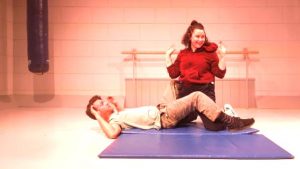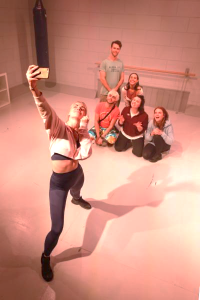By Liliana Padilla. Outhouse Theatre and Red Line Productions. Director Claudia Barrie. Old Fitz Theatre. 13 August – 3 September, 2022.
Reviewed : 13 August, 2022*

It’s an opportune time for Sydney to see Liliana Padilla’s Yale Drama Prize-winning play about issues of desire, consent, power, toxic masculinity, sexual assault and rape – and whether training in self-defence can ensure anyone’s safety. It centres on the aftermath of gang rape and assault of a young college student by two male students. It deals with the fear of her fellow students, their guilt, their damaged self-esteem – and their faith in self- defence training.
Padilla sets her play on a college campus in America. But it could be any campus. In fact it could be any school, any party, any back alley, even a government office … as Grace Tame, Chantelle Contos, Saxon Mullins, Brittany Higgins have revealed. The play calls out the need for change and the failure of society to attack the root causes of such violence.
With the new NSW affirmative consent laws in operation since 1st June this year, it’s an opportune time for Outhouse, Red Line and Claudia Barrie to premiere this gutsy play.
Padilla’s writing is stark and direct – and Barrie ensures her production is as punchy and provocative as Padilla’s pen. Neither writer nor director allows the implications of this play to be anything but clear and confrontational.
Barrie is a strong director, and she demands similar strength and conviction from her cast. Strength to sustain the work outs, routines and pace that their ‘self-defence’ classes demand. Conviction because the characters they play are raw, angry, afraid … yet eager and enthusiastic, taking their first independent steps in a world away from the safety of home. Barrie’s cast realise all of this in a production that is fast, punchy and visceral.
They perform on an austere, antiseptic set designed by Soham Apte to emphasise the sterility of the gymnasium. Grey brick walls and floor, a bench, some shelves, an exercise barre. A perfect space where lighting designer Saint Claire can throw vivid blues, mauves and reds to accentuate the rollercoaster of emotions the characters face – and the changing pace with which they face them.

All seven actors sustain that pace. All seven make their characters unambiguously real. Their different reactions to the rape are reflected in their faces, the way they relate, react, and retreat.
Brittany Santariga is Brandi, the self-defence instructor, seemingly confident but covering the guilt of failing to protect her friend. Santariga shows this in a taut control that is betrayed in her eyes and her recognition of the fear and vulnerability of others – especially her friend Kara, played by Jessica Spies.
Kara is a disturbed young woman who covers her weakness with over-confidence and brashness. Spies epitomises all of that, especially in one graphic description that rings so clearly to the audience of the hurt and suffering she really feels.
Georgia Anderson and Madeline Marie Dona play Diana and Mojdeh, friends who have joined the class together.
Diana is a Mexican who has had to fight her way against classism and racism. Dona makes her strong, lithe, watchful, quick to take offence – but ready to help, console. Not once does she lose her accent, nor the feistiness that she injects into this character.
Mojdeh is almost her opposite. She is softer, naïve, anxious to find love – and lose her virginity – but also a little scared. Anderson makes all of this clear, in her trust and acceptance of others, especially in her budding relationship with Andy, one of the two young men who join the class.
Michael Cameron, who plays Andy – and Saro Lepejian, who plays his friend, Eggo – are ‘good guys’, sympathetic, anxious to be supportive, but a little unsure of how to show it. Andy does so by gentle flirtation, Eggo by his awkward gawkiness – except when he dances.
Of all the characters Padilla creates, Nikki is the one with whom many audience members will identify. She is shy, she lacks self-esteem, she is tentative, she sees herself as a victim.

It’s not an easy role, but one any female actor would love to play – and one Jessica Paterson obviously relishes. Her Nikki is tentative, unsure. There is the hurt of past mistreatment in her alert, wary eyes. Yet she is determined to participate. Nothing is more telling than her surprised, gentle smile when she succeeds in a difficult move; nothing is more poignant than her anguish later in the play.
If this sounds a distressing play, of course it is! But there is humour, tons of action and hope. Claudia Barrie finds all the theatricality of the script. The fast repartee, the funny failures as they practice defence tactics, the boxing routines, the music and movement – all of these off set the strained relationships, the sad messages, the fear, and the continual realisation that institutions – and governments – have constantly failed to take action
It is a fine, brave production – one that should be picked up exactly as it is and taken to wider audience.
First published in Stage Whispers magazine
*Opening night